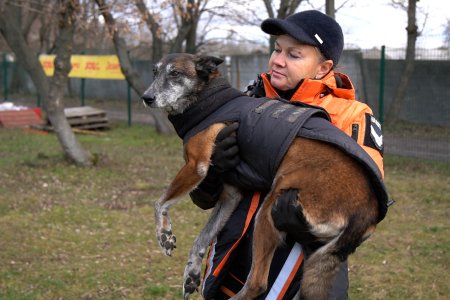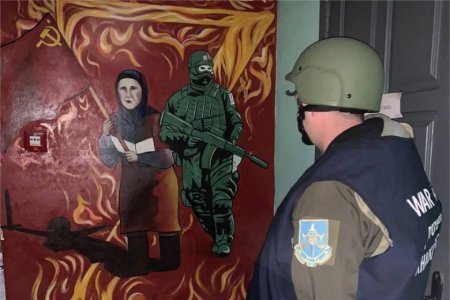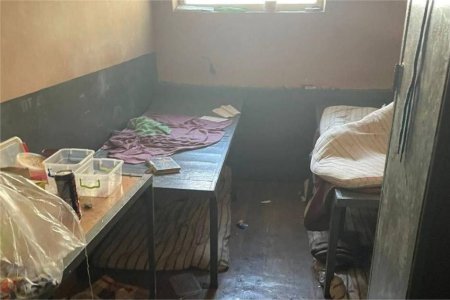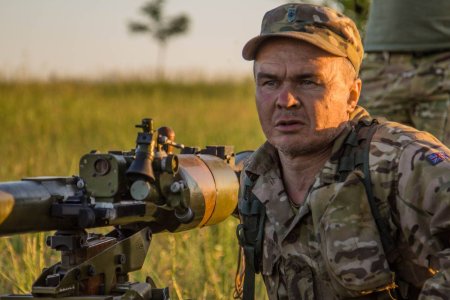I am a pensioner. What am I doing now? Now we only raise chickens. Two dogs and two cats. Such is our household.
Who do you live with?
I live with my eldest son, Anatolii. He is a bachelor. The youngest son lives nearby, and he is married. He has two children. The granddaughter is 25, and the youngest grandson will be 17 on June 11. And so we are, together. I am retired, and my son is retired. He worked as an electrician in plastics and retired at 55.
Could you imagine that there will be a full-scale war?
No. Until the 24th, no one could even think about it. When the first explosions started at five in the morning, I did not believe the war had begun. I heard an explosion — one and then another. I was in my bedroom, which faces a cafe. I thought someone was partying all night — they probably celebrated a birthday. I got up, opened the window, and saw sparks flying and lights. And then again — “boom”! The third time! And the sparks were no more. But I didn’t think it could be a war. I thought they were shooting at a cafe. But it turned out differently. In the morning, they announced that it had thumped in Brovary, in a military camp. They said 12 people died. That’s how it all started. I needed to get this straight in my head.
When was Zalissia occupied?
You know, I didn’t record it. A young neighbor said that on March 8, tanks drove in. My son Anatolii saw it. He said: “Tanks are coming.” Then he started putting things in bags and carrying them from home to the cellar. I also started to pack. I was confused about what to do and where to go. We have a poor cellar. The explosion made a hole, and the bricks began to shift. The house, however, stood. Well, the blast damaged everyone’s windows; no place had windows intact. I have windows damaged in the bedroom and upstairs. But our main problem today is the door. They came, and measured, and inserted something. The blast also damaged it. It’s warm now, but before, it was cold.
So, one day, I didn’t know what time I was in the cellar after dinner. Anatolii came in and sat down, then lay down and fell asleep. I was sitting, dangling my legs. I’m sitting, and suddenly such a barrage, as if all the houses will now rise and fall. Then I heard a terrible noise as if a huge object had flown by and disappeared. I screamed: “Anatolii!” I told him something had just passed and disappeared somewhere between the huts. We were afraid that the house would burst into flames. He instantly rushed out of the cellar, I followed him, and there were many steps. He told me the roof was damaged. Thank God it didn’t catch fire.
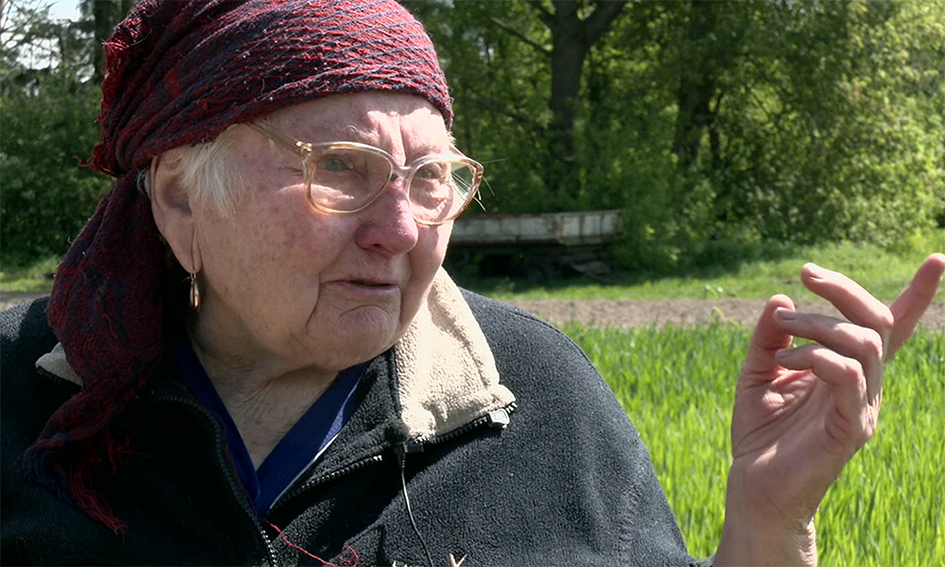
A lot of slates were broken on the roof. My daughter covered her roof with iron, so they brought slates (and we had some, too), and we fixed the roof. This site of the house was intact, but the balcony door, windows, and glass were knocked out. The greenhouse‘s frame remained, but the glass flew out. The garden got damaged. The rabbitry was destroyed, and one rabbit was killed. The neighbor had a barn, and a garage was attached to it: the roof was hit from above, and the garage was gone. The fence in my son’s house was beautiful but now pierced.
What happened in Zalissia during the occupation?
At first, it seemed to be calm. And then the Russians started shooting. Two people came in and asked where the son was. I asked: “What do you want?” — “Talk.” — “He was here, and maybe he went to the toilet.” They waited and said: “We leave now.” One was a short guy, and another was tall. They came in and sat down in armchairs: one was chatting, and the other leaned over so that I couldn’t even see his face. Oh, Lord!
Once, the short one met Anatolii and asked him for a smoke. Anatolii went to the cellar and brought him two packs of cigarettes. Then he said: “I will tell these [Russians] standing across from you not to shoot here.” They were on the street corner. The neighbors had just made a new fence, but the Russians came on a tank and pushed it down. A neighbor asked what it was hanging on a tree, looking like packages. The Russians replied: “Don’t you dare go to the garden.” — “And why?” — “These are mine cords hanging.” They hung booby traps, and what if people came out? Let them be killed? Is that how it goes?
Did the invaders hide their equipment close to private houses?
They dug a hole near the neighbor’s house and put the tank there so no one would notice them. They looked where they could hide. They didn’t come to us because there was nowhere [to hide]. And the neighbor had a wide garden and a barn with a garage, so they had space to use. They stood there, dug a hole, and then dug a dugout for themselves. The neighbors were sitting in the cellar; the man used to serve in Kyiv and is now retired. Another neighbor, daughter, son-in-law, and grandson hid in the cellar when the tanks appeared. Russians broke into their house; apparently, they wanted to eat. She told us later: “In our cellar, candles were burning, and we could hear that someone was up there.”
So he [the Russian] went down to the cellar, listened, and said: “Get out!” — They were silent. —“Get out, or I’ll throw a grenade!”
They got out and were interrogated: how many people were in the cellar? Well, three adults and a grandson. The Russians already had time to visit the house. The neighbor told me there were new boots, so the Russians left the old ones and took the new ones. They stole new panties and a lot of other things. I feared them, but the neighbor went to them when they were stationed at the street corner. She asked when there would be a green corridor. She even argued with them. “Why did you shoot at the bathhouse? “ — “No, it wasn’t us,” they said.” They lied!
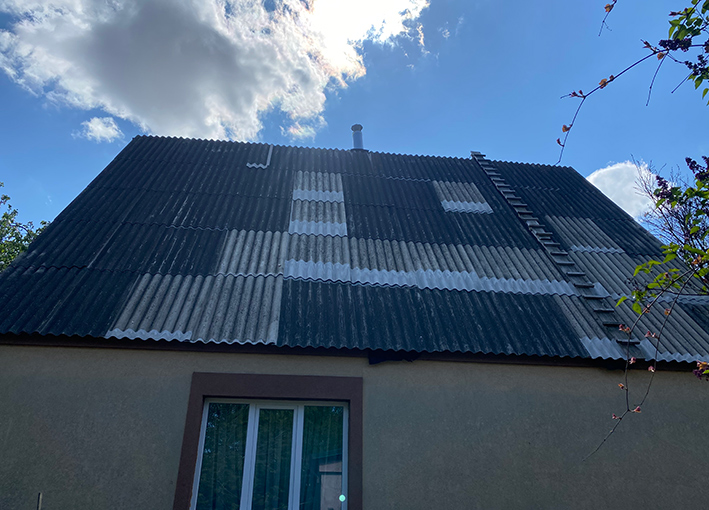
Did they shoot every day?
Yes, they started at eight in the morning, and, it seems, they were shooting until six in the evening. We had less here, but over there — at the end — they shot heavily. They probably fired from Bohdanovka.
How did your youngest son evacuate?
A relative lives in Bohdanivka; tanks drove there, and the shooting started. He called and said: “Zhenia, you need to leave. We are leaving. Shooting is impossible.” What to do? They had to run. They dropped everything and got together. They just took the papers. As soon as they left, the tanks came here.
One man also was driving, and they started shooting, killing him. It happened opposite this house with a beautiful fence.
He was traveling with his wife and mother-in-law. He was driving, and the wife sat beside him (she leaned over). The wife was hurt a little, and the mother-in-law had her hand or something else injured. The neighbor brought them to his place, and the man was pulled out of the car, but he lay on the pavement next to the car for four days. He died immediately.
Why didn’t you want to evacuate?
The son said, “How can we give it all up?!” He didn’t think we could be killed. He said so, and I answered: “Okay, what will be, will be. Let’s pray to God to save us.” So we stayed. There was a green corridor, but it was necessary to go to Bohdanovka, where buses were loaded at the village council. However, we didn’t know about it, and no one told us anything. And how would I get there? I can hardly walk. There are three kilometers to go, and I would not have reached it. We wouldn’t go anyway. We would have stayed here until the very end.
I was born in 1941. I am from the Chernihiv region, from Krekhaev. We lived there for two years: the Germans entered the villages, but they did not kill people and did not burn the huts. However, one day they rode on motorcycles, and one of our partisans started shooting at them and shot one German. So they burned the whole village and divided the people into two groups. Some were taken to Germany, and some were driven to Semypolky on foot. I was already two years old. Half of the people were brought to Cherkasy, some to Brovary. I don’t know how it is now, but before, everything was wooden. The warehouse was wooden; it stood for a long time where the church was.
The Germans drove people with children there. I was with my grandmother, mother, and her younger sister; my father was taken to the front. They rounded us up and wanted to set fire to the wooden warehouse. And then, out of nowhere, an officer appeared and said there was no profit from this. He said taking people to Germany and letting them work for you is better. Well, they loaded people into a freight train. I was only two years old, but I remember it like a dream: a green hut, a big room, there were 12 of us there. Putin destroys people the same way. Well, what is his profit? Why are you destroying people, houses, and everything around you?
Has your attitude towards Russians changed?
You know, I don’t even know what I would do with them if it were possible. They are parasites! And slackers! When Ukraine and Russia were divided, we visited there. Even then, their fields were abandoned. Farms were overgrown with weeds. The Russians appear on TV: “We are Russia, Russia, and Putin!” So, kiss him, you know where! And he — you. What are you doing with Ukraine? I watch TV and cry because my soul hurts so much. They destroyed everything. Well, what do you get from all this, you bastard?!
